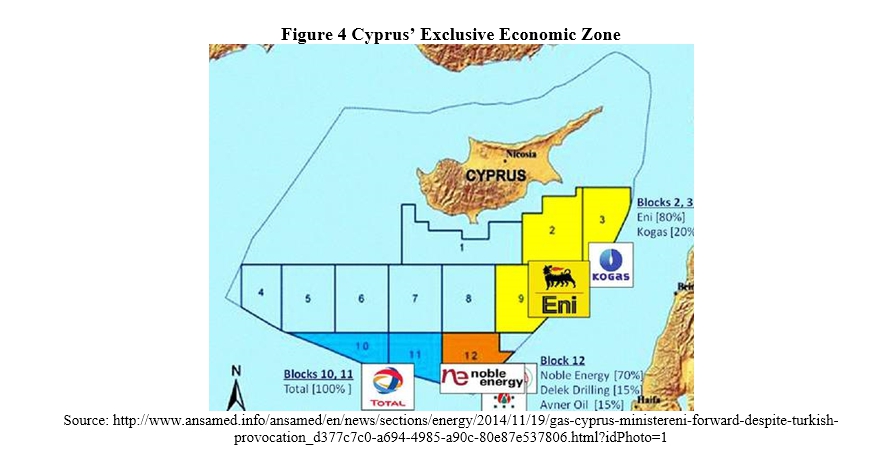Together with participants from the Senior Executive Program for Nation-Building by Nation – Building Institute, I am in the process of planning a study visit to Cyprus, an interesting country that can provide very useful lessons for Thailand.
Cyprus is a member of European Union (EU). Even though Cyprus is a small country, it has considerable importance in terms of geopolitics because of its location, which lies between three continents: North Africa (Egypt), Southern Europe (Turkey) and West Asia (Syria) (Figure 1). Cyprus is situated on the sea route connecting the Mediterranean Sea with other important oceans. This makes Cyprus an important economic and military transport route, which has led to more powerful countries becoming interested in controlling and establishing bases on the island.
From the economic perspective, Cyprus has continuously developed their economy. According to World Bank criteria, in the year 1987 Cyprus graduated in status from a middle-income country to a high-income country.[1] During the period 1977 – 2016, the size of Cyprus’s economy expanded by a factor of 15.5 times. Per capita income (GNI per capita in US$ – Atlas methodology) increased from US$ 1,530 per person per year in 1977, to US$ 23,680 per person per year in 2016 (Figure 2).
The important strategies that enabled Cyprus to develop from a middle-income country to a high-income country and maintain sustained economic growth to the present day are:
- Tourism Promotion
From information published by the Cyprus Statistical Service, income from tourism as a proportion of GDP increased leapt ahead in the period 1976-1990; from the lowest level of 2.1 percent per GDP in the year 1975, to 23.4 percent in the year 1990.[2] The number of tourists increased from 47,000 in the year 1975 to be 1.56 million people in the year 1990 (Figure 3). The increase in the number of tourists had considerable benefits for the country’s economy, increasing demand for local products and expanding both direct and indirect employment.
Apart from external facilitating factors such as the peace after the end in 1974 of the invasion by the Turkish Army in the year 1974, and increase in popularity of travel in the Mediterranean countries[3], the marked growth in tourism was due to several government measures:
1.1 Opening the country to the entry of international airlines for the first time made tourist travel to Cyprus much more convenient;
1.2 Development of tourist facilities around coastal towns, and restoration of tourist sites, hotels and accommodation that were destroyed during the invasion by Turkey;
1.3 Entry to the United Nations World Tourism Organization (UNWTO) in the year 1975[4] linked Cyprus with global travel organizations that can share their knowledge, innovation and best practices in tourism with the country;
1.4 Promoting investment in the tourism industry by provision of low interest loans and tax exemption for investment in the tourism industry.[5]
At present, tourism remains the major industry of the country and Cyprus is a popular summer destination in Europe. The beaches are the cleanest in Europe, the weather is the second best in the world, and Cyprus is one of the oldest wine producing areas in the world. Importantly, in June 2017, a partnership contract was signed between Melco International, Hard Rock and Cypriot CNS Group in order to build the biggest casino in Europe, which will constitute another of the country’s important tourist attractions.
- Foreign Investment Promotion
Apart from tourism, Cyprus is among the most attractive investment countries in the EU, for the following reasons:
2.1 The environment is conducive to business
1) The country has a quality workforce owing to their good education. Cyprus has the reputation of being the most educated country in the EU (most educated in EU, according to EUROSTAT); in the age range 30-34, close to 50 percent of people are university graduates (higher than the EU average of 40 percent).
2) Safe environment: among the small countries, Cyprus is the safest country in the world and the safest country for teenagers.
3) The legal system based on English Common Law principles is recognized as the most business friendly, effective, transparent and reliable for the business sector.
2.2 Setting appropriate investment incentives[6]
1) Establishment of Exclusive Economic Zones (EEZ), comprising 13 blocks of the seafront area, and requiring some businesses to be located in the EEZ, such as oil and gas businesses. The location of the source of natural gas in the EEZ has attracted investment from some of the world’s leading energy companies, including Noble Energy (USA), Eni (Italy), and Kogas (South Korea) (Figure 4).
2) Attraction of investors through tax incentives. Cyprus has the lowest corporate tax in the EU, 12.5 percent, and in order to attract investors the government has set many tax exemptions, such as on income from dividends or profits from the sale of securities and on profits from foreign investment in Cyprus. Also there are incentives for the establishment of innovative businesses such as reduced interest for start-ups, and a tax structure that supports businesses related to intellectual property.
3) Citizenship-by-Investment Programmes[7]. With a minimum investment of € 300,000, foreign investors can apply for permanent residence through investment in real estate. The investor’s family, including a wife or husband, as well as children, can also qualify for permanent residence. Cyprus citizenship can be obtained through investment of a minimum of 2 million Euros through various channels, such as buying Government Bonds, Cyprus company acquisition, and real estate investment such as purchase of houses, offices, shops, and hotels. The former governor of Ukraine and co-founder of Privatbank, Igor Kolomoisky is one example of an individual who obtained Cyprus citizenship through the Citizenship-by-Investment Programme.[8] The Cyprus Interior Ministry reports that this programme has attracted many thousands of US dollars in foreign investment over the past three years, representing one-fourth of the country’s GDP.[9]
For Thailand, we know that Thailand gives priority to the tourism industry and is looking hard for investment from abroad. Cyprus’s approach may provide good lessons for Thailand that could be applied to help drive Thailand forward to become a high-income country in the future.
[1] https://datahelpdesk.worldbank.org/knowledgebase/articles/906519-world-bank-country-and-lending-groups
[2] Sharpley, R. (2009). Tourism Development and the Environment: Beyond Sustainability?.
[3] https://www.ucy.ac.cy/erc/documents/Effects_of_Tourkish_Invation.pdf
[4] http://wtd.unwto.org/fr/members/states และ http://affiliatemembers.unwto.org/content/why-join
[5] https://www.ucy.ac.cy/erc/documents/Effects_of_Tourkish_Invation.pdf
[6] https://www.manager.co.th/Business/ViewNews.aspx?NewsID=9590000082222
[7]http://www.ey.com/Publication/vwLUAssets/Doing_business_in_Cyprus_Your_strategic_investment_hub_eng/$FILE/Doing_business_Cypruslowres.pdf
[8] https://www.theguardian.com/world/2017/sep/17/the-billionaires-investing-in-cyprus-in-exchange-for-eu-passports
[9] http://www.eb5investors.com/magazine/article/cyprus-program-attracts-global-investors-for-european-passport
Source :amthaipaper
ISSUE 0131 (November – December 18)
Kriengsak Chareonwongsak
Senior Fellow at Harvard University’s Center of Business and Government.
kriengsak@kriengsak.com, http://www.kriengsak.com




